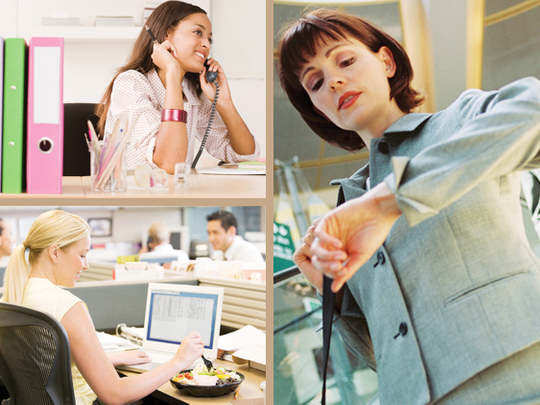
Dubai: If you work a regular nine to five job, spending about 45 hours-a-week at your office, then the majority of your time is probably spent with your co-workers. Spending that much time with the same group of people every day, it's not surprising that everyone's annoying little habits, including your own, are more prominent. For that reason, office etiquette becomes a top priority for all work places.
US-based Professor Christine Pearson, co-author of The Cost of Bad Behavior, and her colleagues conducted a corporate survey, which found that 48 per cent of mistreated employees deliberately lower their productivity and 12 per cent said that ill-mannered behaviour urged them to quit. In the UAE's multi-cultural community, it becomes imperative to maintain certain social standards of office etiquette because lack of awareness won't always justify your social blunders. Good etiquette comes as a saviour for all of us.
"Office etiquette plays an important role on work environment because it's not just how you portray yourself as a corporate employee, but it also helps ensure that your co-workers are comfortable with you. It creates a positive influence on productivity and workflow," said Smita Nair, a UAE-based human resources manager with nine years of experience. "Be honest with your work and commitment, respect seniors, be punctual, and keep your desk space neat."
Starting with respecting space, especially in an open plan environment, you need to respect everyone else's work area. Experts at Worketiquette.com suggest setting clear boundaries from the beginning by making sure you are approachable, but at the same time clarifying what you consider your personal space.
If you need something from a neighbour, it's more appropriate to walk around to their partition instead of popping your head over the top, or shouting things across, you're not in a market after all. And stop peeking into each workstation as you walk past or staring at someone's screen.
With an open work space, you will end up hearing all the things happening around you even if you don't mean to, but out of good manners never push yourself into a conversation, whether it's a work question you can answer or a private conversation you'd rather not hear - just ignore and focus on your work.
Eating at your cubicle is another edgy etiquette area. It's preferable to have your lunch in the kitchen, but when you absolutely can't leave your desk for a meal, ask your nearest colleagues if they mind. Choose food without strong odours and always remember to dispose the trash in the kitchen, not in your own waste basket.
Eating manners
Of course, following basic eating manners are vital, such as not talking with your mouth full. No one wants to see food being chewed or hear it being chomped. It is impolite to put too much food in your mouth and definitely never lick your fingers loudly.
Waking up every morning thinking what to wear can be a daily pain for women, but according to Mary Gormandy, co-founder of Mobile Technical Institute and MTI Business Solutions, a US-based corporate training and consulting firm, it's essential to dress in a manner appropriate to your work place and your position. It's not only about respecting the workplace, but it's also about your image. A woman, especially, is supposed to look for clothes that are appropriate for the office and keep her make-up simple and light.
It is imperative to maintain personal hygiene. It helps if you keep some essential hygiene items at your desk such as deodorant, cologne and maybe even a toothbrush to use after lunch or before an important meeting. Living in a place where it feels like summer most of the year, it isn't a shock if you arrive to work a little sweaty, but that doesn't mean your co-workers should be subjected to the smell.
One of the most prevalent etiquette problems in the modern world is improper cell phone usage, beginning with the personal phone conversations that can go on for hours. If it's a must to be on the phone, you can do it in a private place and definitely not in a hallway where your voice can be heard. Find a closed place. It's disrespectful and inappropriate to impose your telephone conversations on other people.
People more frequently tend to breach respect when leaving their phones on loud mode during meetings, or taking calls while in the middle of conversations with a co-worker or a superior. Beverly Langford, author of The Etiquette Edge, teaches management communication in the Robinson College of Business, Georgia State University, Atlanta. She points out in her work that the increased use of technology makes people feel more weighed down by all their tasks and less considerate of their behaviour. Don't be a slave to your cell phone.
Many people have forgotten the basic etiquette principle that the person talking to you at a given times deserves your full attention. Ignoring or postponing conversation with the person with you to take a call from someone else is rude, and conveys a general lack of respect.
Meetings are another place where you're at risk of committing an etiquette error. To avoid getting on your boss and co-workers bad side, make sure that you arrive on time to a meeting or even a little earlier if possible. If you absolutely have to arrive late, let someone know, and walk in as quietly as possible without interrupting. Anthony Balderrama, a writer on CareerBuilder.com, reminds you to keep any negative energy outside of the meeting as well because people will notice your bad attitude. Besides, for most people meetings are not something to look forward to so you don't need to mope about it.
Be prepared for the meeting, whether it's having a pen and paper or your presentation all set. Nobody wants to be the one interrupting the boss' speech, while they fish around in their pockets for a spare pen.
Pay attention during a meeting. This means you are listening to the person speaking and not texting away on your phone. If someone else is speaking, don't interrupt unless the speaker has allowed for open comments and questions. If you do make any comments or questions, make sure to keep them succinct, relevant and short. Don't divulge information from the meeting to everyone in the office; treat the discussion in the meeting as confidential.
Lacking basic e-mail etiquette in the work place can easily make or break you, too. Remember that using your e-mail at work requires professional behaviour just as face-to-face and phone conversations do. Use your professional e-mail for strictly work-related purposes and avoid checking your personal e-mail throughout the day. Don't send non-work related e-mails, jokes, or forwards to the entire office on company time.
Most importantly, always make sure that your Subject, To, and From fields are filled out correctly. You don't want to accidentally send a confidential e-mail to your entire department.
The level of formality that you use in your e-mail should always be professional. Always address people with a professional title first, until they indicate the level of formality with their reply. Also avoid using emoticons in a professional e-mail as well.












